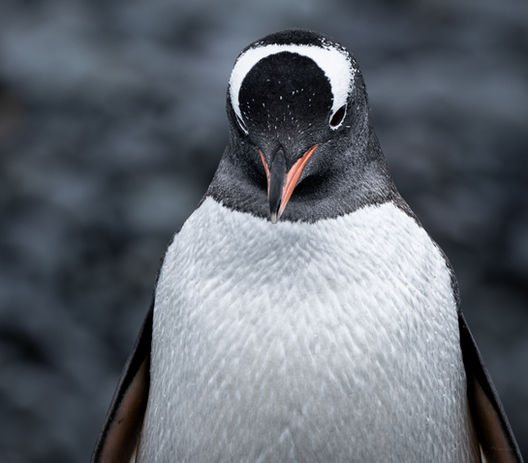


The marine wildlife on the Falklands is precious and unique
and it is in need of conserving.
On the Falklands you find Rockhopper penguins and black browed albatros nesting next to one another in steep cliffs.
You can observe the cautious Magellanic penguin in their tussock burrows and watch them dutifully shuttle between their nesting sites and the sea all day to forage, passing over the should be pristine white sandy beaches that outline a lot of the coast on the Falklands.
The number of Magellanic penguins are in rapid decline and are listed as near threatened.
You can find the northernmost colony of the majestic King Penguin on the Falklands, summer home to over 1500 breeding pairs at Volunteer Point. It is a natural wonder to behold as they surf the swells coming onto the shore to get to their nesting sites with bellies full of fish and jellies for their young.
The Falklands is home to over 100 000 pairs of Gentoo penguins spread out in 85 colonies and can be found on all the isles of the archipelago year round. They are avid travelers between their nests and the ocean, the parents take turn in watching the young while the other one goes out to sea to provide food.
You can also find the Macaroni penguin here, in very small numbers. They migrate to the Falklands to breed in the summer and only 24 breeding pairs have been observed. The global population of Macaroni penguins are in rapid decline, which makes the threats to their presence on the Falklands even more immediate.
Other nesting sea birds on the Falklands include Shearwaters and Petrels whom all call the Falklands their home during the breeding season.
You can read a lot more here about the abundant marine wildlife on the Falklands.
Above information curtesy of

The Falklands
The Antarctic Peninsula
South Sandwich Isles
South Georgia
Chile
Argentina
Image provided by Google Earth
An archipelago surrounded by a vast and bountiful ocean
The waters aound Falklands are known as the Exclusive Economic Zone.
These waters above the Patagonian shelf are the most productive in all of the South Atlantic.
The high productivity in these areas are due to strong upwellings of cold Sub- Antarctic waters that meet the shelf waters around the archipelago.
The fishing industry has developed around the Falklands since the 1950's.
There are two main kinds of fishing around the archipelago: trawling and jigging.
Both local and distal discarded and lost fishing gear are the main cause of marine littering around the coastline of the Falklands.

Adobe stock image
Falklands vistors are helping us make a difference
During a phone call to the Falklands Conservation in October 2023, we learned that the marine debris (plastic trash) on the othervise pristine white beaches of the Falklands this year, was extremely bad this season. Massive winter storms have washed up a lot more marine litter on the beaches than usual.
We have involved an environmentally caring expedition cruise operator with the Falklands on their itinerary to aid us in our mission to mitigate plastic pollution here.
We are incredibly proud and happy to announce that we have now successfully arranged several beach cleanings on the Falklands to mitigate the plastic pollution.
Visitors that come here with our partners are equipped with gloves and bags and put to work in areas with known marine littering.
All equipment we use are re- usable and will be provided to our partnering operators alongside a very thorough SOP to best preserve the environment we work in.
ALL MARINE LITTER THAT LEAVES THE BEACHES OF THE FALKLANDS WITH US WILL BE PROPERLY DISCARDED AND RECYCLED WHERE POSSIBLE.
We have reached our fundraiser goal.
The wildlife on the Falklands will now have a healthier environment with less plastic thanks to your generosity.

Falkland Conservation
Discarded fishing gear
Discarded fishing equipment is the greatest contributor to marine littering washing up on the beaches of the Falklands. Lost nets and lines will tangle up wildlife and causes a slow and painful death by starvation.

Falkland Conservation
Help the Magellanic penguins
The Falklands are home to the beautiful and vulnerable Magellanic penguin. Their numbers are rapidly declining due to marine pollution, illegal hunting and climate change. They are often victims of ghost fishing nets.

Falkland Conservation
Buried "treasure"
As marine litter is washed in on the beaches by the waves, it is quicky buried and starts decomposing below the sands, leaving strands of plastic at the surface. Buried litter often turns into a real "treasure hunt".
Clean up efforts in 2022 left the beach at Sunders island several hundreds of kilos lighter of plastic




Our
Story
Hi!
Our names are Hedda Andersen (Norway) and Rodrigo Lira (Chile). Combined we have worked in the expedition tourism industry as guides and lecturers for more than a decade. We frequent some of the most remote and vulnerable areas on the planet in our jobs. We have vitnessed terrifying change and destruction through our years in the "line of duty", and we want to do what we can to mitigate environmental problems where we can.
We care deeply about protecting and conserving what is left of nature on our planet.












